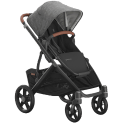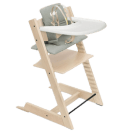
How to Soothe a Teething Baby
You and your baby have finally settled into a great bedtime and sleep routine (and past the four month sleep regression!), and you’re coasting on some well-deserved parenting confidence. Then it happens: your previously content, good-sleeping baby is fussy, irritable, and waking up throughout the night. Sound familiar? You’ve probably hit a major milestone—teething.
While the crankiness isn’t fun for anyone, there are plenty of safe home remedies for soothing your teething baby.
What Is Teething?
Your baby is teething when the first baby teeth begin erupting through the gums. Typically, the first two teeth to erupt are the bottom central incisors (the two bottom front teeth). Lower teeth tend to erupt before upper teeth, and teeth usually erupt in pairs.
When Does Teething Begin?
Most babies begin teething at 6 months, but teething timelines aren’t set in stone—your baby may not get their first tooth until their first birthday arrives! And most (but not all) children will have all 20 of their baby teeth by the time they’re 3.
What Are Signs of Teething?
There are a lot of myths surrounding teething, and you’ve probably heard them all. The only reliable sign of teething is a new tooth poking through, but you may also notice:
- Increased fussiness and irritability.
- Swollen and red gums.
- Increased drooling and chewing on toys and fingers.
- Less interest in solid foods.
- Changes in sleeping patterns.
Keep in mind that every symptom listed above can also be part of normal development. No one’s always in a good mood, including babies.
Tips for Soothing a Teething Baby
It can be tough to watch your little experience teething pain, but fortunately, there are plenty of safe options to ease fussiness and soothe sore gums. Best of all, most of them involve everyday household items that won’t cost an extra dime.
- Use your fingers or a damp washcloth to massage your baby’s gums—the pressure can ease discomfort.
- Cool a damp washcloth in your fridge on a clean surface, and allow your baby to chew on it. Just remember, you don’t want to freeze it.
- If you’ve introduced solids, try feeding your little one cool foods, like yogurt and applesauce.
- Chill a spoon in the fridge, and use the rounded back on your baby’s gums to apply cooling pressure for relief.
- Solid teething rings and toys (avoid using any teether that’s filled with gel or other liquid) can also be cooled in the fridge for your baby to chew on. Teethers that are easy to grip will be less frustrating to your fussy baby, too.
- Your baby will be extra drool-y, so make sure to keep their mouth and chin dry to avoid a rash.
- Give your baby extra TLC! Plenty of hugs, cuddles, and snuggles will comfort your little one.
Teethings FAQs
Can Teething Cause a Fever?
Fever accompanying teething is one persistent old wives’ tale. While teething can cause a slight rise in your baby’s temperature, it shouldn’t cause a fever. If your baby’s temperature reaches 100.4° or your baby has diarrhea, it’s time to call the doctor.
Are There Teething Remedies You Should Avoid?
To safely treat your little one’s teething pain, the Mayo Clinic warns parents to avoid using:
- All over-the-counter topical treatments that are meant to be applied directly to your baby’s gums and teething tablets, including ones labeled “homeopathic”. There’s no evidence that either provides any relief to your fussy little one.
- Medications containing benzocaine or lidocaine which can be harmful—and even fatal—to babies and young children.
- Teething necklaces, bracelets, and anklets (more on that, below).
Are Teething Bracelets, Necklaces and Other Jewelry Safe?
The U.S. Food and Drug Administration (FDA) recommends against using teething jewelry that claims to reduce teething pain. Teething necklaces and bracelets pose a risk for choking, strangulation, infection, and mouth injury. So while that amber jewelry may be super cute, it’s best to stick to pediatrician-approved remedies for teething symptoms.
How Should You Care for Your Baby’s New Teeth?
Many parents wonder if it’s important to take care of baby (primary) teeth, given that they fall out and are replaced by permanent teeth. But taking care of baby teeth is critical for several reasons:
- Research shows that diet and dental hygiene during the baby and toddler years reduce the chance of tooth decay as your little one grows up.
- Primary teeth—like permanent teeth—are susceptible to cavities. In fact, 23% of all kids under 5 will get a cavity, which may end up requiring a tooth extraction.
- If baby teeth require removal, there will be gaps without erupting permanent teeth. Those gaps can allow teeth to shift and may prevent permanent teeth from coming in correctly. Down the road, that could mean braces.
- Kids need healthy teeth to chew, speak properly, and even smile.
The American Academy of Pediatrics (AAP), the American Academy of Pediatric Dentistry (AAPD), and the American Dental Association (ADA) recommend that all children have a dental visit before their first birthday. So when that first tooth appears, go ahead and schedule an appointment.
You’ll also want to start brushing those pearly whites and introducing fluoride, as well. Use a soft bristled brush (or one made from silicone) and a small amount of toothpaste with fluoride (for teething babies, about the size of a grain of rice) to brush your baby’s teeth twice a day. Aim for brushing after breakfast and right before bedtime.
How Can You Keep Your Baby’s New Teeth Healthy?
Good oral hygiene is so important to your child’s overall health and development, and the AAP has great everyday guidelines for maintaining dental health:
- Don’t put your baby to bed with a bottle! Sugars in formula and breastmilk will linger in your little one’s mouth, increasing the chance for tooth decay.
- If your baby is over 6 months old, add 4-8 ounces of water—which contains fluoride, a natural mineral that prevents cavities—to their daily diet.
- Research suggests that breastfeeding the first year can cut the risk for tooth decay in half (likely because it boosts your baby’s immune system and keeps their gut biome healthy).
- Even before your baby is teething, get in the habit of wiping down their gums with a clean damp washcloth after each feeding.
- Introduce brushing with a fluoride toothpaste once new teeth poke through, and once your baby is about a year old, introduce twice daily brushing for 2 minutes at a time. (There are some fun apps and YouTube videos to help with this!)
- Around your child’s first birthday, introduce a cup and begin transitioning off a bottle.
- Avoid sugary drinks, like soda, juice, or anything with added sweeteners. Juice isn’t recommended for any baby under 12 months, and even after, the AAP recommends limiting juice to 4 ounces a day—and doing a 50/50 mix of juice and water is best.
- Be a water-drinking family! Make water the primary drink choice in your home.
- Plan on seeing a dentist twice yearly for your child to receive a fluoride varnish (a preventative care service and covered by all public and private health insurance plans).
Do You Need to Call a Doctor?
While teething can definitely interrupt sleep, cause discomfort, and make your baby seriously fussy, its symptoms should be manageable and relatively temporary (generally, cutting a teeth should only cause your baby 3 or 4 days of pain).
If your baby has a fever, diarrhea, is inconsolable, or is refusing to eat, it’s time to check in with your pediatrician.
Finding What’s Right for You
Albee Baby is the oldest family-owned specialty baby shop in the US, and we pride ourselves on providing our customers with the best assortment of baby products anywhere, at fair prices, always. We’re committed to being an inclusive resource for parents, and hope you’re feeling empowered to find the right baby gear for your family. Still have questions? Feel free to contact our baby gear experts at 877.692.5233 or by email at info@albeebaby.com.
 Car Seat Sale
Car Seat Sale
 Stroller Sale
Stroller Sale
 Home Sale
Home Sale
 Feeding Sale
Feeding Sale
 Activity & Entertainment Sale
Activity & Entertainment Sale
 Bath & Potty Sale
Bath & Potty Sale






 Car Seats
>
Car Seats
>
 Strollers
>
Strollers
>
 Cribs
Cribs
 High Chairs
High Chairs
 Baby Carriers
Baby Carriers
 Travel Cribs & Playards
Travel Cribs & Playards
 Wagons
Wagons
 Home
>
Home
>
 Bath & Potty
>
Bath & Potty
>
 Diaper Bags & Backpacks
Diaper Bags & Backpacks
 Toys
>
Toys
>
 Gifts
>
Gifts
>
 Clothing
>
Clothing
>

















 Infant Car Seats
Infant Car Seats
 Convertible Car Seats
Convertible Car Seats
 All-in-One Car Seats
All-in-One Car Seats
 Booster Car Seats
>
Booster Car Seats
>
 Travel Systems
Travel Systems
 Car Seat Accessories
Car Seat Accessories
 Single Strollers
Single Strollers
 Double Strollers
Double Strollers
 Single-to-Double Strollers
Single-to-Double Strollers
 Lightweight & Compact Strollers
Lightweight & Compact Strollers
 Jogging Strollers
Jogging Strollers
 Bicycle Trailers & Child Seats
Bicycle Trailers & Child Seats
 Stroller Accessories
Stroller Accessories
 Stroller Frames
Stroller Frames



































